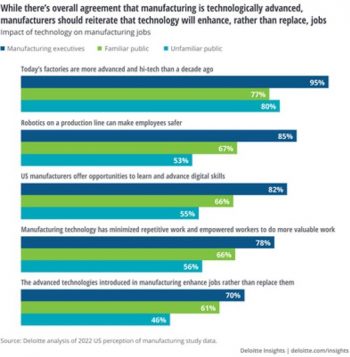
Consumers Increasingly View U.S. Manufacturing Industry as Innovative, Critical and High Tech
New York, NY – The Deloitte and The Manufacturing Institute 2022 Manufacturing Perception Study found affirming news for the construction industry’s perception among consumers and workers, with emphasis on positive steps that the industry can continue to take to improve perceptions and promote growth in the sector in the coming years. Full report available here.
 Key takeaways from the surveys include:
Key takeaways from the surveys include:
- 64% of consumers surveyed view manufacturing as innovative, up from 39% of respondents five years ago.
- Big gains in technology advances in manufacturing, but public awareness lags.
- Attracting and retaining a quality workforce is a top focus for 83% of manufacturers surveyed.
- Almost 45% of manufacturing executives surveyed have turned down business opportunities due to lack of workers.
- Majority of workers still prefer jobs in other sectors, such as retail, services, and technology.
U.S. manufacturing is at an inflection point: The sector is increasingly viewed as crucial to economic and pandemic recovery, yet outdated public perceptions could be impacting recruitment of vital new workers, according to study findings by Deloitte and The Manufacturing Institute.
A persistent shortfall of workers and a skills mismatch for smart manufacturing could slow down economic growth and manufacturing competitiveness. The study found perceptions are starting to change, especially due to the manufacturing industry’s response to the pandemic, but there are areas that still need attention.
Disconnect between perception and reality
According to the surveys, perceptions do not reflect the current level of technological advances, benefits and salary levels in the industry. The manufacturing sector should work to bring public perceptions in line with the current reality of the industry to attract the stable, skilled workforce needed for economic growth and global competitiveness.
Perceptions
- Competition with other sectors: The surveys showed manufacturing companies are increasingly competing with other sectors for skilled labor. Manufacturing ranks behind technology, health care, communications, energy and financial services as preferred career options.
- Technology: Two-thirds of consumer respondents see manufacturing jobs as innovative and problem-solving oriented. Manufacturers should reiterate that technology is expected to enhance, rather than replace, jobs. For instance, digitalization, robotics and artificial intelligence can make jobs safer and enable employees to do more productive work.
- COVID-19 impact: The public’s understanding of how crucial manufacturing is for the U.S. economy has increased as a result of the COVID-19 pandemic response, especially given the industry’s designation as essential in producing ventilators and PPE and keeping supply chains rolling.
“The pandemic has raised awareness of the essential role of manufacturing in our lives. We are now at a watershed moment when a new wave of workers is needed to further advance our use of technology and maintain U.S. economic competitiveness. This industry is critical to bolstering our economy long term,” notes Paul Wellener, vice chair and U.S. industrial products and construction leader, Deloitte LLP.
Attracting and retaining talent
Although 84% of manufacturing jobs lost during 2020 were added back to payrolls, turnover remains high. To retain them, manufacturers should involve existing employees, and evolve the work and workplace.
- 58% of surveyed respondents feel manufacturing jobs have limited career prospects, but 80% might be interested in roles with enhanced training and clear career paths.
- Manufacturing executives recognized that more diversity and balanced gender representation are likely to expand the available talent pool. While 84% of the surveyed manufacturing executives felt that their company is effective in fostering an equitable and inclusive. environment for new hires, they also acknowledged that more work needs to be done.
- The ability to attract entry-level recruits is very difficult; strong brands in local markets pose challenges.
“Manufacturers are working hard to fill open jobs and connect more Americans with rewarding careers. As an industry we are focused on continuing to improve perceptions — so that students, parents, educators and more understand the great opportunities available in modern manufacturing. With new or strengthened initiatives, companies can engage new employees, keep existing employees and bolster their reputations of providing sought-after careers in their communities,” explains Carolyn Lee, president, The Manufacturing Institute.
About The Manufacturing Institute (MI)
The MI grows and supports the manufacturing industry’s skilled workers for the advancement of modern manufacturing. The MI’s diverse initiatives support all workers in America, including women, veterans and students, through skills training programs, community building and the advancement of their career in manufacturing. As the workforce development and education partner of the NAM, the MI is a trusted adviser to manufacturers, equipping them with resources necessary to solve the industry’s toughest challenges.
About Deloitte
Deloitte provides industry-leading audit, consulting, tax and advisory services to many of the world’s most admired brands, including nearly 90% of the Fortune 500® and more than 7,000 private companies. Our people come together for the greater good and work across the industry sectors that drive and shape today’s marketplace — delivering measurable and lasting results that help reinforce public trust in our capital markets, inspire clients to see challenges as opportunities to transform and thrive, and help lead the way toward a stronger economy and a healthier society. Deloitte is proud to be part of the largest global professional services network serving our clients in the markets that are most important to them. Building on more than 175 years of service, our network of member firms spans more than 150 countries and territories.